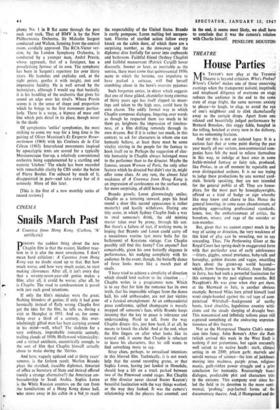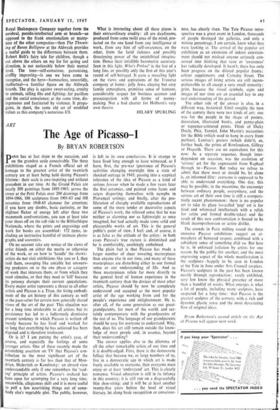House Parties
THEATRE And yet this is not an isolated lapse. It is a curious fact that at some point during the past year nearly all our serious, non-commercial com- panies have felt the need to relieve themselves in this way, to indulge at least once in some feeble-minded fantasy or fairy tale, produced, like Pinkus, in an off moment by reputable and even distinguished authors. It is no use trying to judge these productions by any normal yard- stick. Strictly speaking, they are not intended for the general public at all. They are house- plays, for the most part by houseplaywrights, offered as a kind of badge or sign whereby like may know and cleave to like. Hence the general lowering, in some cases abandonment, of anything approaching professional standards; hence, too, the embarrassment of critics, the boredom, misery and rage of the outsider or non-member.
But, given that we cannot expect much in the way of acting or direction, the very weakness of this kind of play can be revealing, not to say rewarding. Thus, The Performing Giant at- the Royal Court last spring dealt in exaggerated form with that particular area of early adolescence —titters, giggles, sexual prurience, baby-talk and horseplay, golden dreams and vague, unsettling fears about the grown-up world beyond— which, from Simpson to Wesker, from Jellicoe to Jarry, has had such a powerful fascination for this company in the past eighteen months. Bill Naughton's He was gone when they got there, at the Mermaid in July, is another obvious example. Bernard Miles here pitted himself (and won) single-handed against the red tape of com- puterised Whitehall—background of earthy boots, lewd chuckles, lugubrious country witti- cisms and the steady slurping of draught beer. This nonsensical and infinitely tedious piece still captured something of the endearing unpreten- tiousness of this theatre.
Not so the Hampstead Theatre Club's excur- sion into fancy. John -Bowen's After the Rain (which arrived this week in the West End) is nothing if not pretentious, but again uncannily well suited to its native heath : stark, clinical setting in AD 2300; prison garb; marvels and untold menace of science—the hint of jackboots moving into madness, purple prose, religious mania, guilt-ridden power struggle and a grim conclusion for humanity. Reassuringly banal dialogue, predictable plot and characters trite in the extreme. This company ever since has led the field in its devotion to the more senti- mental, 'probing,' pap-factual forms of the documentary theatre. And, if Hampstead and the Royal Shakespeare Company together form the cerebral, pseudo-intellectual arm or branch—as opposed to the frank emotionalism or matey- ness of the other companies—then The Thwart- ing of Baron Bolligrew at the Aldwych provides a useful guide to the differences between them. Robert Bolt's fairy tale for children, though a cut above the others on my list for acting and direction, is not noticeably below their mental level. The tone—self-conscious, patronising, stuffily improving—is one we have come to recognise, and the hero—humourless, unworldly, ineffectual—a familiar figure on the Aldwych boards. The play is against sweet-eating, cruelty to animals, telling fibs and fighting; for pacifism and the social conscience; at the same time, dis- ingenuous and fascinated by violence. It propa- gates, in short, the same old set of muddled values as this company's notorious US. What is interesting about all these pieces is their extraordinary crudity: all are daydreams, produced from some twilit area of the mind, pro- tected on the one hand from any intelligence at work,, from any hint of self-awareness, on the other, from the lurid richness and possibly threatening power of the uninhibited imagina- tion. Hence their infallible barometric accuracy. Seen in this light, Who's Pinkus? is the last of a long line, or possibly only the first of this year's round of self-betrayal. It casts a revealing light on the views and aspirations of the Traverse company at home: jolly Jews, cloying but cosy family atmosphere, primitive sense of humour, considerable respect for business acumen and preoccupation with all forms of money- making. Not a bad charter for Holborn's very own theatre.
HILARY SPURLING































 Previous page
Previous page